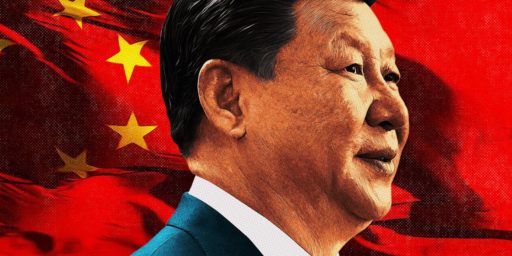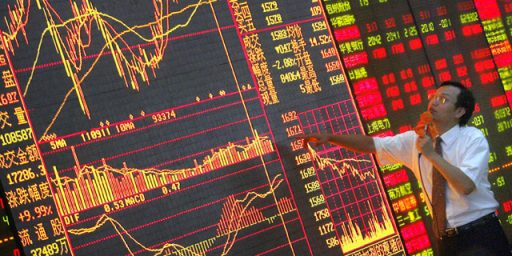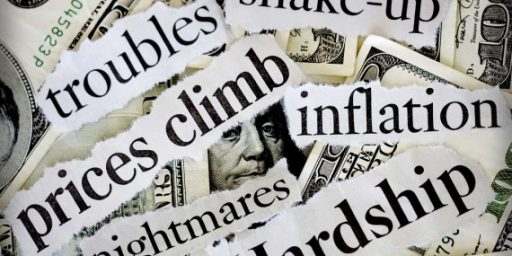Jittery About China
I’ve got to admit that these two stories, taken together, have me a mite worried about the economic situation in China. First, a Chinese bank regulator is warning that imprudent loans are causing a credit bubble in China:
China’s top banking regulator on Sunday warned of the risks from surging bank lending, singling out the dangers of unhealthy growth in the property market.
“(We) must control the risk of real estate loans,” said Liu Mingkang, the head of the China Banking Regulatory Commission, adding that measures must be taken to better evaluate the creditworthiness of borrowers.
Liu said bank lending had helped stabilize the economy so far but made one of his strongest calls yet to banks to guard against taking excessive risks.
“In the first half of the year, our country’s banking loans expanded rapidly and helped play an important role in stabilizing the economy, but the loans growth has led to accumulated risks also increasing,” he was quoted as saying in a statement on the China Banking Regulatory Commission website.
Hat tip: Glenn Reynolds
On top of that an “econophysicist” has predicted that the Chinese stock market will collapse within the next week:
The boom and bust nature of economics is one of the most puzzling aspects of the modern world. In the last year or so, many people have learned to their cost that when bubbles burst, businesses, jobs, and livelihoods can go with them.
So an obvious question arises: can we spot bubbles when they occur and predict when they are about to burst? One group of theorists say that they can and have used their techniques to make an extraordinary prediction.
First, they say that they’ve found the telltale signs of a bubble in the growth rate of the Shanghai Composite stock-market index. And second, they say that this bubble will burst between July 17 and 27.
That’s a brave move, so let’s look at it in more detail. The theorist behind this prediction is Didier Sornette at the Swiss Federal Institute of Technology, in Zurich, who has pioneered the study of market bubbles. Last year, he used his method for spotting bubbles to reveal that oil prices where dangerously inflated.
The telltale sign of a bubble, he says, is a faster than exponential growth rate caused by a positive feedback mechanism that generates this nonlinear growth.
The faster than exponential growth rate is relatively easy to spot. According to the analysis done by Sornette and a few mates, the Shanghai Composite Index certainly seems to have had a faster than exponential growth–a 69 percent rise since October of last year.
Hat tip: Steve Antler
The authors of the article in Technology Review appear skeptical of the methodology used for the prediction, appropriately I think.
I’ve never had much truck with the “China will pull the world out of its economic slump” notion but a serious economic downturn in China would be very bad news, indeed. I’ve long thought that China’s economy was a lot weaker and less stable than it was being credited for and a country of more than a billion people teetering on the brink of poverty going into economic collapse is no laughing matter.





